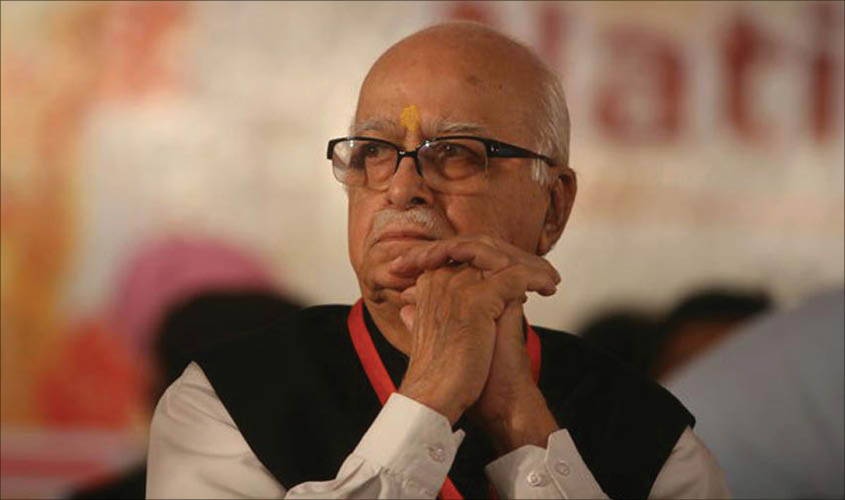The denial of the Bharatiya Janata Party ticket to Lal Krishna Advani, one of the best known political faces in the country from Gandhinagar in Gujarat, brings down the curtain on the primary architect of the saffron outfit. It is without any doubt that if the BJP’s influence has grown over the years, it was essentially because Advani, more than any other person, including Atal Bihari Vajpayee, provided the much-needed motivation to the cadres to march ahead, when all appeared to have been lost in the 1984 Parliamentary polls. The BJP had secured merely two seats in the Lok Sabha and even the Rashtriya Swayamsevak Sangh had been preferential towards the Congress in that particular election, which was the nation’s way of paying tribute to the martyred Indira Gandhi, who in the 1971 war had partitioned Pakistan.
Taking over from Vajpayee—viewed in political circles more as a leader influenced by the country’s first Prime Minister, Jawaharlal Nehru—Advani gave the requisite direction to the party which culminated in the formation of the first non Congress government in 1996, though for a brief period of 13 days. It was due to his tireless effort that Vajpayee was able to become Prime Minister twice over in 1998 and 1999. However, the supreme irony was that Advani could never repeat the success story in 2004 and 2009 when it was his turn to take over the reins of the government.
Indira Gandhi’s political adviser, Makhan Lal Fotedar in his book, The Chinar Leaves, has implicitly indicated that the BJP stalwart became a victim of a Brahminical conspiracy, which had sought to displace another Brahmin, P.V. Narasimha Rao, following differences within the Congress. Advani, who was in complete control of the BJP, had grown antagonistic to Rao, wanting him out at all cost like many Congress leaders, including N.D. Tewari, Arjun Singh and Madhavrao Scindia. The then Prime Minister had used the Jain hawala diaries’ disclosures to eliminate many of his political rivals. There was an entry mentioning Advani’s name and he showed his indignation by deciding not to contest any election till his name was cleared. In the meanwhile, Fotedar convinced Advani’s closest aide, the late Krishan Lal Sharma that the only way of terminating Rao’s tenure was if another Brahmin leader was drafted to do so. On Sharma’s persuasion, Advani agreed to propose Vajpayee’s name for Prime Ministership in 1995 at the BJP’s Mumbai conclave. The rest is history.
Advani, who had the best of relations with the RSS, fell out of favour following his ill-fated visit to Mohammad Ali Jinnah’s mausoleum in May 2005. This was a part of his image makeover from being a hawk to a dove sought to be brought about with the help of Sudheendra Kulkarni, a Vajpayee aide and former journalist. This proved to be his greatest undoing, since unlike Vajpayee he was never viewed as a moderate leader. The profile transformation exercise resulted in his no longer being considered as a Hindutva hardliner. The paradox is that this position is now held by Prime Minister Narendra Modi.
Advani’s golden period was in the early 1990s, soon after he embarked on his historic Rath Yatra from Somnath to Ayodhya, which brought the Ram Mandir issue onto the centre stage of Indian politics. The deftness and the rationale manner in which he answered queries from the international media, left little doubt that he was one leader who was in absolute command of both his thoughts and actions. In fact after the 1990s, the late Chandrashekhar and Advani were the only two politicians who needed no promoting from any quarter to address complex and convoluted issues that they were confronted with.
In the Parliament House premises, a British journalist once asked Advani whether he intended to make India a Hindu nation, thus deviating from the principle of secularism. Without a pause, Advani retorted that India was a Hindu country in the same manner as Britain was a Christian country; as in Britain, people could follow and practise any faith, same was the scenario in India as well. However, in the same breath he went on to add that India was secular only because it was predominantly Hindu.
Evidence of Advani’s fading importance and significance came to the fore on several occasions, after he was marginalised and sidelined by the current BJP dispensation in 2014. Along with some other senior leaders, Advani was made a part of the Marg Darshak Mandal, a body created to accommodate senior functionaries above the age of 75 years. Over the past five years he had made every effort to recreate his relevance, but with peripheral success. At his most crucial hour, his protégés had chosen to desert and abandon him, and some who would literally prostrate before him, opted to look the other way.
Of late the BJP stalwart’s disillusionment had grown to such an extent that he had begun asking political colleagues whether he would be granted the party nomination from Gandhinagar. Given his seniority and contribution to the BJP, he should have been in a position to declare his own candidacy. The announcement of him being replaced by Amit Shah from Gandhinagar sent out several strong messages. The first and foremost was that Advani’s era had ended. Henceforth, the new order was firmly in the saddle and thus there would be no looking back. Between Us.

